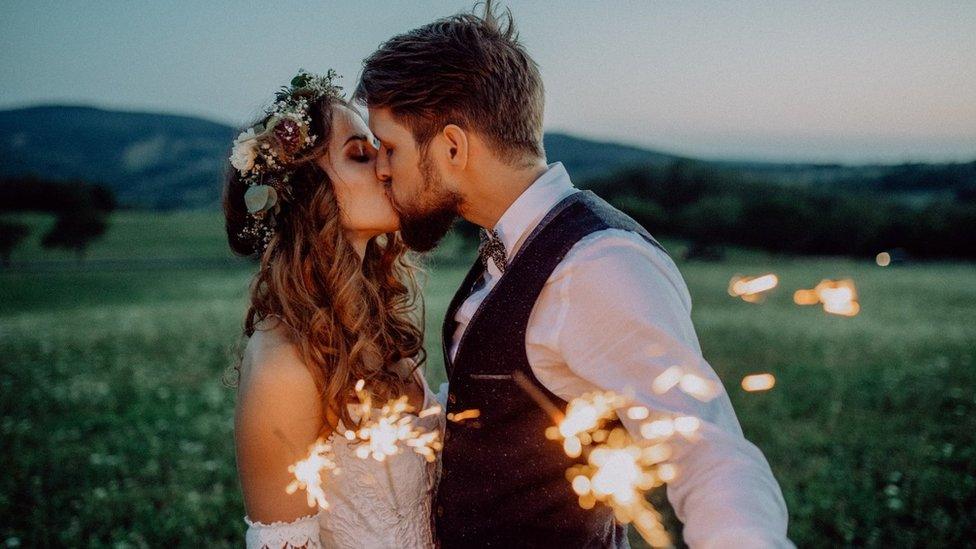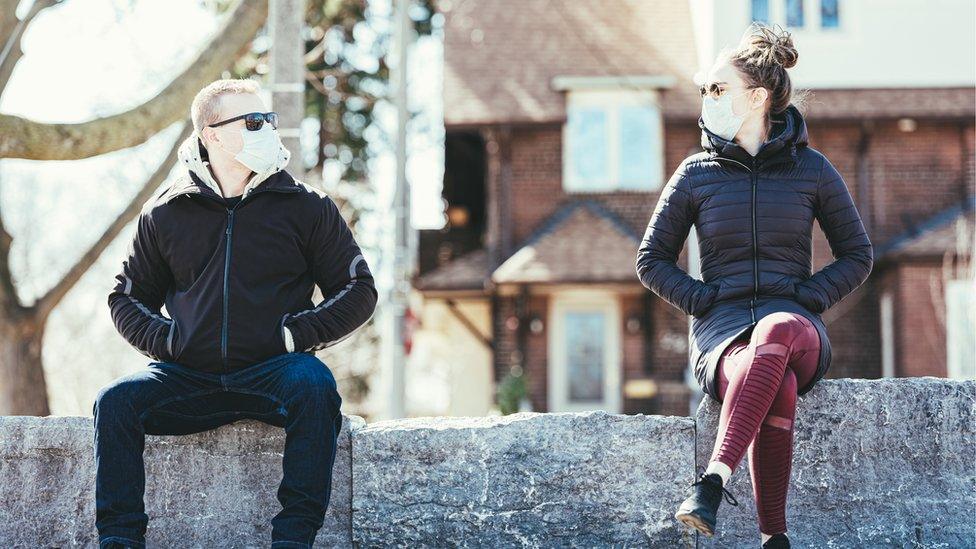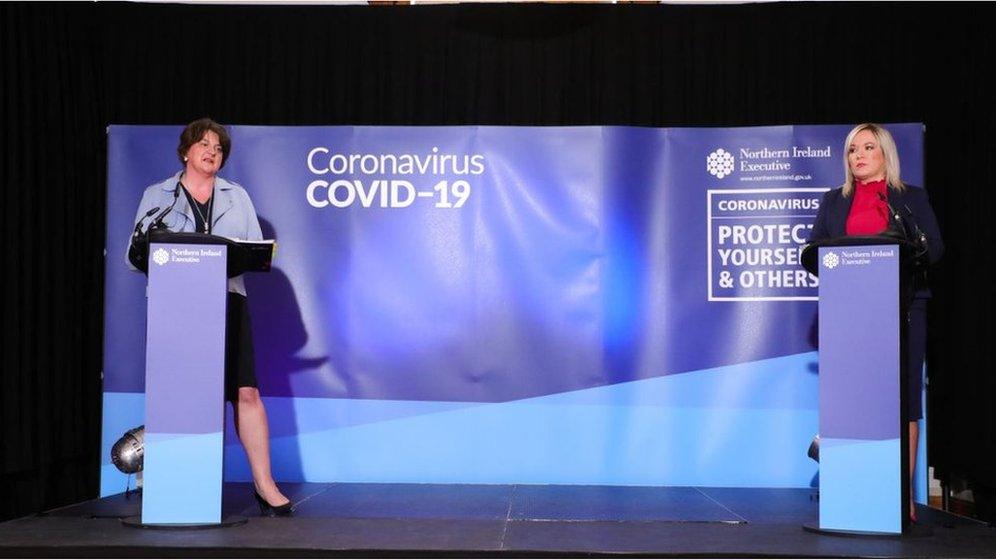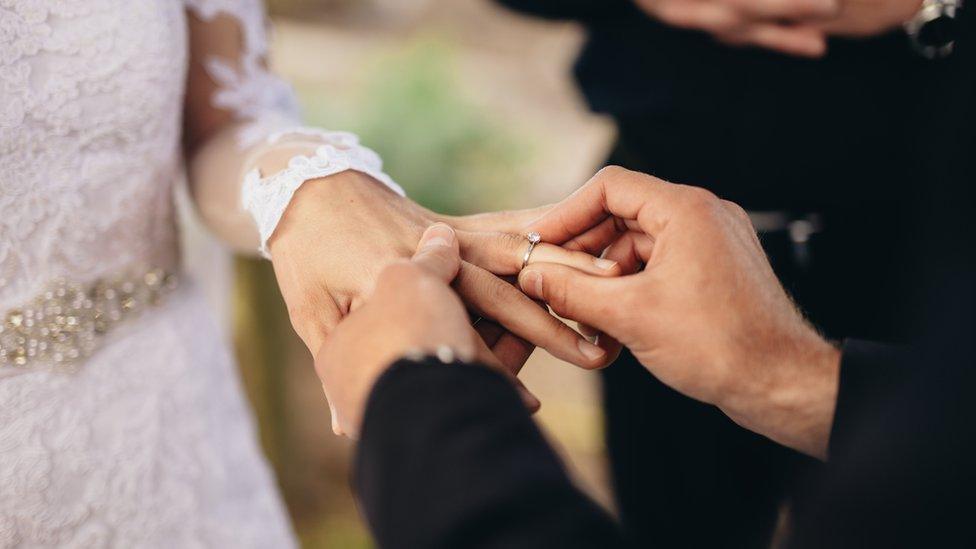Coronavirus: Stormont gives green light to more lockdown easing
- Published
- comments

Small outdoor weddings will be allowed in Northern Ireland from Monday, ministers have agreed
The easing of more lockdown restrictions in Northern Ireland has been given the green light by the Stormont Executive.
The move, which was expected, was dependent on the R-number staying below one when ministers met on Thursday.
From Monday, vulnerable people advised to shield will be allowed outdoors.
Large retailers including car showrooms and shops in retail parks can also reopen, and outdoor weddings with 10 people present will be allowed.
The executive has also confirmed that from Monday, anyone who enters Northern Ireland from outside the Common Travel Area will have to self-isolate for 14 days.
Last week, ministers said the R-number in Northern Ireland was sitting at 0.9.
The R-number, or reproduction number, is the average number of people that one coronavirus-infected person will pass the virus on to.
On Thursday the Department of Health said it estimated that the R-number in Northern Ireland is currently between 0.7 and 0.9, enabling ministers to move ahead.
One more Covid-19 related death in Northern Ireland was recorded by the department on Thursday, bringing its death toll to 535.
The number of fatalities from the virus will ultimately be higher when all deaths in the community are recorded.
Government statistics agency Nisra recorded 716 Covid-linked deaths in Northern Ireland by 22 May.
Shielders and phone shops
The executive's five-step Pathway to Recovery does not include a timetable for each of the phases, but the agreement means Northern Ireland will have implemented some parts of step two in the blueprint.
Measures that the executive will allow from 8 June include:
Small weddings and civil partnership ceremonies permitted outdoors, with no more than 10 people present;
Outdoor sports facilities can reopen;
People can leave home to attend to the needs or welfare of an animal - for example to access a range of services, including dog grooming;
Hotels, tourist accommodation and bed and breakfasts will be able to take advance bookings, ahead of a planned reopening in July;
Large non-food retailers can reopen, including car showrooms, electrical shops and phone shops;
About 80,000 people advised to shield can go outdoors with their household; or if they live alone they can meet one person from another household.
Ministers have stressed that people and businesses must still adhere to physical distancing rules, by staying 2m (6ft) apart.
Easing 'not a free for all'
Northern Ireland's recovery from lockdown will not be "calendar led", and it is likely aspects of different steps of the Pathway to Recovery could take effect at the same time, First Minister Arlene Foster has said.
Speaking at the executive's daily press briefing on Thursday, she said there was a "palpable sense of relief" that Northern Ireland was emerging slowly from lockdown.
"But we must not lose our sense of perspective."
The Health Minister Robin Swann warned that amending some regulations did not mean a "free for all".
"We've taken a big step today in what is available to the people of Northern Ireland," he added.
"Keep working with us and tackling the virus the way we have been, so we can get to a place that's a lot more enjoyable for people."

In other developments on Thursday:
The Republic of Ireland is expected to move to the next phase of its Covid-19 relaxation measures on Monday, the taoiseach (Irish PM) has said;
The commissioner for older people in Northern Ireland has expressed concern about the lack of social contact in care homes;
The number of people attending emergency departments in NI dropped by almost a third in the first few weeks of the Covid-19 pandemic;
People who take part in street protests are putting themselves and others "at risk" from Covid-19, the Public Health Agency has warned.

Deputy First Minister Michelle O'Neill said she was pleased people who have been shielding will be able to leave their homes from Monday - but urged them to protect themselves.
'Find alternative ways to protest'
"We do need your help in the time ahead," she added.
"Your compliance will help us get things done much more quickly and we won't have to reverse any of the restrictions we've been able to lift."
The executive also appealed to the public to avoid attending "dangerous" large gatherings, after concerns were raised about safety at a rally held in Belfast on Wednesday, protesting the death of George Floyd.
"There are alternative ways to protest and I encourage people to explore those alternative ways," said the first minister.

On Thursday evening, the Diocese of Down and Connor said it would resume funeral services and requiem masses with immediate effect, limiting the numbers attending to 10 and observing social distancing.
Churches were closed in March in order to stop the spread of coronavirus.
Could face coverings become mandatory in NI?
In England, the government has announced wearing face coverings on public transport will become compulsory from 15 June.
In response, Stormont's Infrastructure Minister Nichola Mallon said she would meet Justice Minister Naomi Long and Chief Scientific Adviser Prof Ian Young on Thursday evening, about the options "to protect operators and passengers".
Allow X content?
This article contains content provided by X. We ask for your permission before anything is loaded, as they may be using cookies and other technologies. You may want to read X’s cookie policy, external and privacy policy, external before accepting. To view this content choose ‘accept and continue’.
Ms Mallon will meet Translink, NI's public transport operator, along with unions, on Friday to agree a way forward.
In Northern Ireland and the Republic of Ireland, face coverings are recommended for people using public transport or in enclosed indoor public areas where social distancing is not possible, but it is not mandatory.
What will NI quarantine plans include?
The first minister confirmed that from Monday, anyone who enters Northern Ireland from outside the Common Travel Area will be required to self-isolate for 14 days.
The Common Travel Area covers the United Kingdom, Republic of Ireland, Isle of Man and the Channel Islands.
The regulations will include fines of up to £1,000 for anyone who breaches them.
Mrs Foster added that the laws would also apply to anyone arriving into Dublin or other parts of the Republic of Ireland, and then travelling into Northern Ireland.
There would be an information-sharing process regarding the quarantine between ministers in Northern Ireland and the Republic of Ireland, said Mr Swann.
"We've an electronic form that will be filled out at the point of arrival no matter where you land or arrive on this island," he added.
A similar quarantine requirement is already in place in the Republic of Ireland.

EASY STEPS: How to keep safe
A SIMPLE GUIDE: What are the symptoms?
CONTAINMENT: What it means to self-isolate
HEALTH MYTHS: The fake advice you should ignore
MAPS AND CHARTS: Visual guide to the outbreak
VIDEO: The 20-second hand wash

- Published1 June 2020

- Published6 June 2020

- Published28 May 2020
